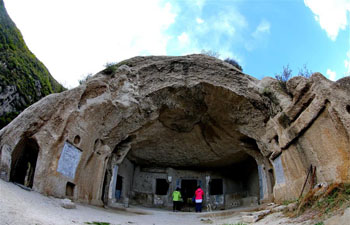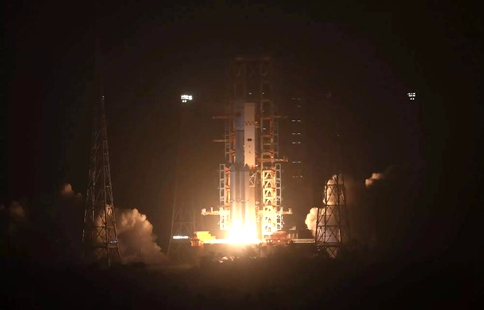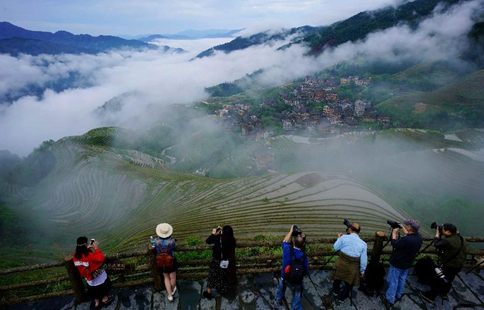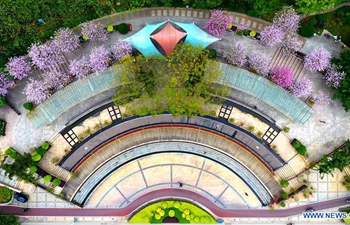by Peerzada Arshad Hamid
NEW DELHI, April 22 (Xinhua) -- In the scorching heat of blazing sun in New Delhi, a man putting mask of Indian Prime Minister Narendra Modi and wearing his trademark sleeveless jacket is flogging half-naked farmers with a whip.
The poor farmers beg for the mercy, seek his intervention into their plight.
"Prime minister, have some mercy, we are drought-hit and have been rendered without food," cried a farmer amid flogs.
"Provide some governmental assistance to us or we will die."
In return to his beseeching cries, he got flogged feverishly and falls on ground unconscious.
This is a snippet from a skit that farmers from severely drought-hit southern state of Tamil Nadu enact to seek attention of India's federal government to their woes.
More than 100 farmers from the drought-hit state have come around 2,450 km to stage their protests in country's capital. The poor farmers have been camping on a road at city's Jantar Mantar for over a month to protest official apathy and seeking relief from the federal government.
"It is actually what we are facing at the hands of government," P. Ayyakkannu, head of protesting farmers told Xinhua.
"So far no official has approached us to know our agonies, instead police is threatening us to leave the place."
With mercury hovering around 43 Celsius degrees this year, New Delhi has been experiencing the hottest April in the last seven years. Amid the heatwave, the protesting farmers have been staging bizarre protests demanding relief.
Jantar Mantar road in New Delhi, serving as an observatory for astronomical measurement, has turned into a ground for protests and agitations in the capital city.
The farmers have brought with themselves human skulls, which they say belong to fellow farmers who have committed suicides due to debts on them caused by drought.
"Enough is enough. Now we have resolved that we are not going to leave this place unless our demands are met," Ayyakkannu said.
"We are ready to die here. Let them (government) lodge us in jails, at least that will be a better place for us."
From wearing skulls to eating grass, mice and pieces of snakes the farmers have been staging mock funerals, tonsuring heads, slashing hands and even stripping naked at Raisina Hill, in a bid to intensify their protest and make themselves heard.
"Drought has snatched livelihood from my family and me," said Prakash, a young farmer aged 27. "Apart from facing food shortage at home because of the failing crops, I lost my job in the wake of the drought."
Prakash, from Tamil Nadu's Tiruchirappalli district, is part of protesting farmers and was working as an marketing agent for a rice mill.
Farmers in Tamil Nadu are reeling under severe stress due to two successive years of drought.
In January this year the local government in Tamil Nadu declared all districts of the state drought-hit following a deficit in the northeast monsoon in 2016.
Earlier this month, India's federal government said it sanctioned a drought-relief package of 222 million U.S. dollars from the National Disaster Response Fund (NDRF) to help state grappling with drought.
However, the protesting farmers said that was not enough to pull them out of the crisis they were reeling under.
"Our assessment is the drought, which has inflicted a loss of 61 billion U.S. dollars on farmers in the state in terms of withered crop and loans that people have raised from different banks," Ayyakkannu said.
"We have not been provided even a single penny as compensation and then most of the people have raised loans from nationalised banks who are still sending in recovery teams."
The farmers said financial assistance from the federal government was necessary for farmers to start farming practises afresh.
"We demand a drought package that would allow us to buy seeds for the next harvest cycle and also compensate us of our losses and debts," said V. Murugesan.
"We want nationalized banks to write off our loans, interlinking of rivers so that our farms are irrigated and government to provide us profitable price for our agricultural products keeping in view the market inflation."
Top court in Tamil Nadu directed the local government loan waiver should be extended to farmers irrespective of their land holdings and restrained officials belonging to cooperative banks from initiating any penal or recovery proceedings against farmers who have defaulted on repayment of crop loans.
The high court verdict has come as a relief for additional 300,000 farmers in the state. However, crop loans from cooperative banks amount to just about 11 percent while the rest of them have been availed from nationalized banks.
"The government is working for corporates and least bothered for farmers," said N. Kittappa Retti, another protesting farmer.
"During election rallies, Modi used to praise farmers as backbone of Indian economy but now with election over, we (farmers) are considered slaves."
Reports said over 50 debt-ridden farmers have committed suicide during past six months in drought-affected districts across Tamil Nadu. However, the protesting farmers put the number of farm-related suicides and deaths to more than 300.
With 40 days passing by, their cries seem to be falling on deaf ears. However, at the same time there seems to be no end to their unusual protests.
"If Modi is still not willing to meet us, we will resort to eating our own faces and drink our own urine," threatened Ayyakkannu.
A placard in Hindi language on a police barricade placed on the Jantar Mantar reads, "Nation's progress cannot be achieved without development of farmers."

















